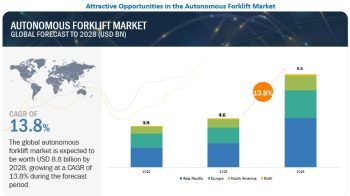The global cell culture market is expected to reach USD 26.28 Billion by 2023 from USD 15.32 Billion in 2018, at a CAGR of 11.4%. This market is experiencing significant growth due to the growing number of regulatory approvals for cell culture-based vaccines, increasing demand for monoclonal antibodies (mAbs), funding for cell-based research, growing preference for single-use technologies, and the launch of advanced cell culture products.
Product launches accounted for the largest share of the overall growth strategies followed by key players between 2014 and 2018. Some of the companies that adopted this strategy include Thermo Fisher Scientific (US), Merck KGaA (Germany), and GE Healthcare (US), Lonza (Swizterland), Eppendorf (Germany), and Becton, Dickinson and Company (BD).
The cell culture market is fragmented with the presence of several large as well as emerging players. In 2017, Thermo Fisher Scientific (US), Merck KGaA (Germany), and GE Healthcare (US) were the leading players in the cell culture market. Other major players include Lonza (Switzerland), Becton, Dickinson and Company (US), Corning Incorporated (US), Eppendorf (Germany), HiMedia Laboratories (India), Sartorius AG (Germany), PromoCell GmbH (Germany), Pall Corporation (acquired by Danaher (US)), Irvine Scientific (US), InvivoGen (US), and CellGenix GmbH (Germany).
Thermo Fisher Scientific (US) is one of the prominent players in the cell culture market. The leading position of the company can be attributed to its strong brand image and robust product portfolio. The company significantly focuses on investing in R&D activities to launch new and advanced products. For instance, the company launched Gibco StemFlex Medium (2017) and Thermo Scientific Nunc Edge 2.0 plate (2016). Furthermore, in June 2015, Thermo Fisher Scientific invested USD 10.6 million (GBP 14 million) to expand its existing facility in Scotland. This expansion was made for the manufacture of dry powder media, which is used in the production of drugs and vaccines for influenza and dengue fever. The company’s efforts towards enhancing its production capacity, its focus on R&D, and the launch of new products will help it maintain its leading position in the market.
Merck KGaA (Germany) is one of the major players in the cell culture market in 2017. The company has a strong portfolio of cell culture products, including cell culture equipment, cell culture media, reagents, and sera. In order to maintain its strong position in the market, the company focuses on adopting organic as well as inorganic growth strategies such as acquisitions and new product launches. For instance, in November 2015, the company acquired Sigma-Aldrich Corporation (US) for USD 17 billion. This acquisition was one of the largest in the industry resulting to serve life science customers around the world with established brands such as Millipore, Sigma-Aldrich, Milli-Q, SAFC, Supelco, and BioReliance. Such developments will help expand the company’s presence in the cell culture market.
Download PDF Brochure: https://www.marketsandmarkets.com/pdfdownload.asp?id=559


